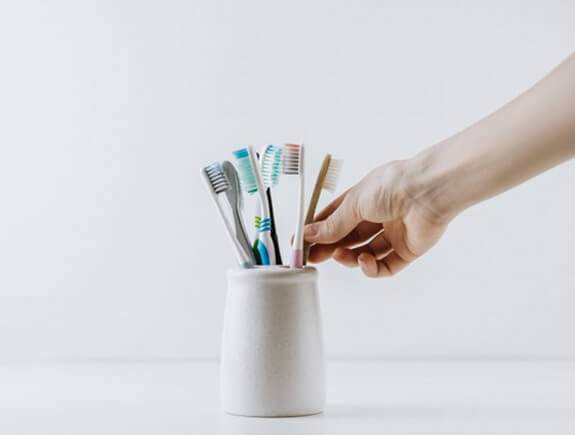Tooth Extractions – West Caldwell, NJ
Building a Healthier Foundation for Your Smile
We’ll do everything in our power to help you preserve your natural teeth. However, if a tooth is damaged beyond repair or is badly infected to the point that root canal treatment is no longer viable, we may have to perform a tooth extraction for the sake of your overall oral health. We’ll take whatever steps we can to make the process of getting a tooth extraction as comfortable as possible for you, and we’ll make sure that you’re fully aware of your tooth replacement options. Here’s a brief guide to tooth extractions in West Caldwell, but please contact our office if you’d like to learn more.
Why Choose Magid Dental Care for Tooth Extractions?
- Start-to-Finish Dental Implant Treatment
- Beautiful, Newly Renovated Dental Office
- Dental Sedation Available
When Are Tooth Extractions Necessary?

Here are some situations in which we may recommend removing a tooth:
- Decay has caused most of the tooth to erode, leaving us unable to treat it with a filling.
- An infection has spread to the roots and killed a tooth, leaving us unable to treat it with root canal therapy.
- A tooth is impacted below the gumline.
- A tooth is cracked or damaged beyond repair.
- Gum disease has caused the supportive tissue and bone to deteriorate around your tooth, causing it to become loose.
- Extraction is necessary to give the mouth enough room for orthodontic treatment
- The dental infection may spread to other teeth or potentially lead to dangerous secondary infections like sepsis.
The Process of Removing a Tooth

Before removing a tooth, Dr. Magid will administer an appropriate anesthetic treatment to ensure that the process is completely painless, and you may also receive dental sedation treatment to help you sit calmly and comfortably through the procedure. Then, he’ll use a tool called an elevator to lift the troubled tooth from its socket before grasping it with forceps and gently wiggling it free from its connective tissue. It’s best to replace lost teeth as soon as possible, so Dr. Magid will discuss your tooth replacement options during your consultation.
Tooth Extraction Aftercare

We’ll provide you with detailed aftercare instructions so you know exactly what to do to keep your recovery process going smoothly and comfortably. You can expect these to include:
- Take prescribed or over-the-counter medications as instructed
- 24 hours after your tooth extraction, rinse your mouth with a solution of eight ounces of warm water and half a teaspoon of salt to clean the surgical site and eliminate harmful bacteria
- Refrain from smoking, as this will hinder your gum’s ability to heal and fight infection
- Avoid drinking through a straw, as this causes shifting of pressure within the mouth that can dislodge the blood clot forming over the extraction site, leading to a painful condition called dry socket
- Refrain from strenuous exercise for a few days after the procedure
- Elevate your head with pillows or cushions when sleeping to stay comfortable
- Get plenty of rest
Replacing your missing teeth with a denture, dental bridge, or implant as soon as possible can also prevent a range of oral health issues such as the remaining teeth slipping out of alignment, gum injuries, and jawbone erosion.
Tooth Extraction FAQs
Does Getting a Tooth Extracted Hurt?
Many patients are anxious about committing to dental treatments because of fear that a procedure will hurt. While it’s understandable that you might be apprehensive about having a tooth extracted, Dr. Magid always begins the process of removing a tooth by numbing the patient’s mouth to ensure that they feel no pain, and you may also receive dental sedation treatment if you need extra help sitting calmly through the procedure. While you can expect some soreness and discomfort after the extraction, you can minimize these issues by strictly adhering to your aftercare instructions to prevent infection and promote healing. If your discomfort seems to be worsening after a few days have passed, call our office, as this may be a sign of infection.
Is There an Alternative to Tooth Extraction?
While many tooth-replacement appliances like dental implants, bridges, and dentures are designed to look and work like real teeth, Dr. Magid's top priority is to preserve your natural smile. Sometimes, the loss of a severely infected tooth may be preventable with treatments like root canal therapy in the case of tooth decay or scaling and root planing in the case of gum disease. However, extraction is only recommended as a last resort after every other possible solution has been ruled out. If Dr. Magid recommends extraction, you can rest assured that it is the best way to restore the health of your smile.
What’s the Recovery for Tooth Extractions Like?
There is a long list of aftercare instructions to abide by while recovering after tooth extraction. One of the most important parts of ensuring a smooth recovery is taking care of the blood clot that forms over the tooth’s empty socket, as its loss can lead to painful conditions like dry socket. To prevent this, avoid smoking, spitting, and drinking through a straw, as these activities can dislodge this protective blood clot. You’ll also need to get plenty of rest while regularly cleaning your mouth by brushing, flossing, and rinsing with a solution of salt and warm water, but follow Dr. Magid’s instructions as to when how you should resume your oral hygiene habits. You can also expect to receive instructions to refrain from smoking, change gauze as needed, use a cold compress, stick to a soft diet, and take prescribed or over-the-counter pain medication. While each patient’s healing process is different, you can expect to start feeling better after about three days.
Can I Leave a Space Empty After a Tooth Extraction?
Many patients may be tempted to think that they don’t need to replace a tooth located in the back of the mouth, but this can lead to a range of oral and overall health issues. For example, the loss of even a single tooth can improperly redistribute the pressure of chewing among the remaining teeth, leading to uneven dental wear and tear. This can also make it harder to chew thoroughly, which can lead to issues like indigestion or malnutrition. You may even develop speech difficulties such as a lisp. We recommend booking a consultation for tooth replacement at our office as soon as you are done healing from your extraction.
